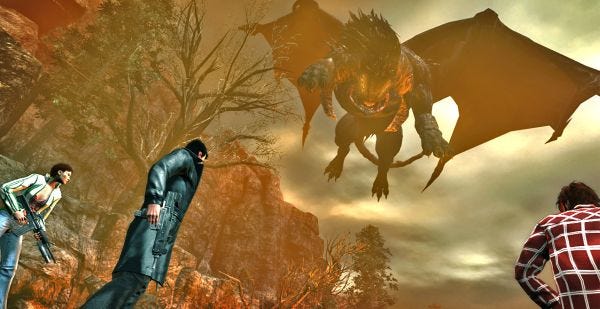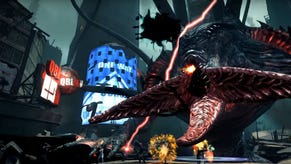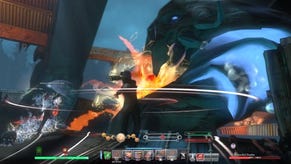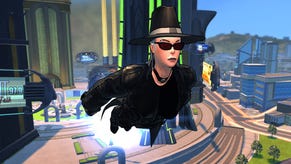Secret World's Tornquist On F2P, Single-Player Games
The Longest Interview, Pt 2
The Secret World is officially live, and we've both locked it in a room with our most dangerous mythical creature, Adam, and hurled questions at creative director Ragnar Tornquist until he cracked - by which I mean "willingly and jovially answered my questions in a highly consensual fashion." And today, the insane brutality continues. Specifically, we discuss free-to-play, what Tornquist plans on doing next (hint: probably not another MMO), social gaming, whether or not MMO business models hurt fun, and more.
RPS: When you first conceived The Secret World, what were you aiming for it to be? Especially in comparison to what it is now, how did you conceive it? Is it roughly what you hoped to create? Did any particularly ridiculous features end up on the chopping block?
Tornquist: Absolutely. If you're not willing to sort of kill your babies, if you're not willing to change as development goes on, then you're not going to succeed. You need to be able to see, like, "This is shit. We can't keep this. We thought this was a good idea, but it's not, so let's move on and do something else." But, I mean, The Secret World is remarkably close to the game it was five or six years ago. Tone and mood and atmosphere and story and all those things - it's the same game.
It hasn't changed a lot at all. When it comes to mechanics, we have gone through a number of iterations of our combat, our RPG system. We've gone for a lot more action, we have the reticule system. We went through a phase where we tested that out and tried not to go in that direction. But it's always been a game without classes and without levels. It's always been a game that's more about free-form progression. I still think it is remarkably close to where it was five years ago. Surprisingly so.
There are some differences in the exact mechanics, and of course there's a bunch of features that were abandoned or cut along the way and new features that we've incorporated. But if I looked at this game through the eyes of someone from five years ago, I would say, yeah, it's pretty much what it should be. It's pretty much the game that we wanted to make. And I'm extremely happy about that, because it's a good idea to stay true to a vision. Even though it's important to make modifications and to change as you go, it's also important to stick to your guns and carry through the vision that you had originally, and not waver too much from that. I think we've done that, and I'm really proud of it.
RPS: When did investigation missions enter the picture?
Tornquist: Having more adventure gameplay was there from the very beginning. That was our heritage. Keep in mind that the original pre-production team on The Secret World was composed almost entirely of people who worked on Dreamfall. And among the people who worked on Dreamfall, there were a bunch that worked on The Longest Journey as well. So we looked at the heritage of the team and we said, well, we're going to make an MMO, and we want to make an MMO where we bring in a lot of adventure elements in. The thing is, for a long while we weren't sure exactly how to do that. We did it with the story. We did it with the ARG that we tied into the storyline, from the Unity gameplay we did outside the game.
But we weren't exactly sure how to translate that into in-game mechanics until our lead content designer, Joel Bylos, came on board. He came over from Age of Conan. He didn't really have any experience with The Secret World, he hadn't worked on the project, but he bought into the vision of it, of being a blend of the MMO with the more investigative or adventure-type game. He came on board and championed that. He basically told us, "Look, this looks great, but let's bake it into the game a lot more. Let's create mechanics and do more with this." So he championed that whole game plan. That was a couple of years back, where we started doing those types of missions.
That informed the whole game. It's funny, it became more like the original vision. It had sort of strayed away from that - become more traditional - but that's when we said, "OK, no, we're going to do this properly, we're going to make this game require more from players, require players to think. We're not going to lead them by the hand through everything. We're going to challenge people, we're going to take a bit of a risk here." Joel was the one who championed that, and it made the game a whole lot better. It's what really makes our game stand out and be unique I think.
RPS: You also had The Secret War running in the lead up to Secret World's launch. It was a neat idea, but it was also a peerless Facebook wall vandalism machine. So why take that route, especially when a lot of core gamers - a lot of the people who are playing The Secret World - are really vehemently against that kind of social gaming?
Tornquist: It's going to sound like I'm dismissing The Secret War, but you have to keep in mind that that's an initiative done by marketing. The production team has been working on The Secret World and making the game. It's been very successful for our marketing department. It brought a lot of attention to the game, and that's something we appreciate. But it's really not something that the production team has worked on or had anything to do with. It's not something I can really comment on that much.
It's an interesting new angle when it comes to how we interacted with our players over Facebook. Yes, I mean, there are a lot of core MMO gamers who are really not the Facebook audience. But at the same time, our marketing guys are trying to really branch out and speak to other kinds of gamers as well, who want to enjoy The Secret World. So I think in that sense it was successful. But the Facebook aspect of The Secret War isn't really meant for those core, core gamers, because they're already aware of The Secret World and they already want to test it out. It's more to bring awareness to those people who don't necessarily know anything about it.
RPS: Are you happy with the kind of exposure that The Secret World has gotten overall, though? I mean, I know a number of people who are extremely excited about it, but I didn't see it at E3, and mainstream awareness of it - even among "core" players - seems pretty hit-and-miss. Like, my roommate works at IGN, and he didn't have any idea it existed (SECRET GET IT) until I started discussing my experiences in early access this weekend.
Tornquist: EA and our marketing guys have done a really good job. E3 was something we chose not to do. It's not the right show for this kind of game. It's a big and noisy and action-y place. The Secret World is an MMO, and it takes a bit more time to get into. That kind of venue isn't very well-suited. So we concretely chose not to go there. We prefer to go for more community-driven or PC-driven events, things like PAX or Gamescom or GDC, those are the places where we have the time to show the game and really lead people through a whole presentation on it. Which the game needs, because it's not the kind of game you pick up and play for three minutes.
I think our guys have done a really good job getting exposure out in general, but it is hard to get attention, especially when you're dealing with a completely brand-new property. Our previous game was based on, you know, the Conan license. Guild Wars 2 is Guild Wars 2, it's a sequel to a very successful, very good game. The Old Republic, obviously [is Star Wars]. All of those games have an easy job getting attention.
But I think given the fact that we're not the biggest company in the world and The Secret World is a brand-new IP, our exposure is pretty good. And I think it's going to increase a lot this week as the buzz from our early access launch starts to get around. We've now, I think, officially launched everywhere. And I think the word of mouth is going to get out there, the press is going to pay attention to it, we're doing more marketing campaigns this week - stuff is happening. So yeah. I could always wish we did more and could see more exposure, but we've gotten a lot of attention and it's good attention.
RPS: Do you ever plan on going back to single-player games, especially single-player adventure games? I know there's a fairly large contingent of people who'd love to see you do that, and - with tons of indie adventures finding nice niches and, of course, Double Fine Adventure - it even seems financially feasible.
Tornquist: I think right now I've made an MMO, and it's taken six years of my life. I'm going to stick around and stay with The Secret World for a while, but I would love to do something [single-player again].
MMOs are hard to make. That's a fact. They're huge and they're complicated and you have to deal with servers and clients and lots of people playing together and everything breaks all the time because it's unpredictable. It's been a great learning experience, and at times an incredible mess trying to keep everything together. I'm happy to have done it, but I think I would love for my next game to not be an MMO. I'd love to do something that's more controlled and more about the single-player experience - leading people through a story. So yes, I'd certainly like to go back to that.
RPS: On that topic, at the end of the day, an MMO has to keep players around for a long time. Otherwise you're not making money, which is a problem. Do you feel like that changes the way you design the game, though? Because in a lot of cases, a single-player game would say, "OK, we're trying to have a point here, so let's shorten this or that. But with an MMO it seems like you'd say, "Well, maybe we can put a couple of extra missions here just to keep the player occupied longer." Is that ever a thing you run into? Do you feel like designing with a subscription in mind hurts your pacing?
Tornquist: That's a really valid question, and it's a danger to pad out the gameplay in order to keep players around. A lot of single-player games these days are designed to keep players playing for a long time. You have DLC, you have multiplayer modes, you have achievements - you have all these mechanics that are designed in order to keep people playing the game for a long time. Some single-player games keep players occupied for as long a time as MMOs. I mean, look at Skyrim. People are still playing that game. They started playing it the day it came out, and they're still playing it because the world is huge and there's so much to do. Is it padding? I don't think so.
It's trying to make the game immersive and all-encompassing as possible. Of course we want you to stick with our game, of course we want people to pay us. But it's never been the driving force behind our mission design, for example. Never have we designed a mission where we said, let's add three more tiers with killing 20 more zombies because that'll keep the players playing longer. We always consider the pace of the missions. We want people to sit down and be entertained, finish a mission, and be happy about it. It's not a goal in itself to keep players occupied as long as possible. It's a goal to make players enjoy the time they spend and make them feel like it was worth their time.
The way we work towards getting players to stay with the game is to add more content. That's always been our philosophy, it's all about having the content, it's about adding more content. Wherever you go in The Secret World, there's more content than you need in order to progress. There's always choices. And there are mechanics in place that will keep some players playing long after the content has run out - like PvP, like the lore, like the achievements, like crafting, like the dungeon runs, doing it over and over again in order to get better gear. And it's not a cynical move on our part. We also realize that people enjoy this, people enjoy playing games in order to get better at them. People enjoy playing games in order to get better rewards, to get better achievements, to feel they're improving. That's what MMOs are all about.
It's a world where there is enough content to keep you occupied for a very long time, and that's always been our goal. I don't think any of us want to just be cynical and create a padded game that just keeps going and going and going. I think players would hate that. I think our game is well-paced. We estimated about 150 to 200 hours to get through the content in the game, which is not an enormous amount. But it's enough to justify both the price tag and the subscription costs. And beyond that, players are free to engage in any kind of longevity mechanic as they please. Or they can play the new content that's been released.
RPS: Currently your business model is subscription-based. In light of how many games are going free-to-play right now, why did you decide to go subscription-based with Secret World?
Tornquist: No triple-A, big MMO has launched yet with a free-to-play model. I know that Guild Wars 2 is coming up and is free-to-play, but they're also launching with a item store and I'm not exactly sure what they'll be selling there. Our item store is cosmetic only - things that are nice, but not fundamental to gameplay. We wanted to go subscription-based because we think that players are happier paying a steady monthly fee to get new content, to get the service, to get all the benefits of a game that has a growing, living world, than to keep charging them for little things.
That's important to us. The subscription fee and our business model supports a big, ongoing team. We have content plans for a very long time. We have content that's going to be coming on a regular, ongoing basis. We have content that's going to come out pretty soon. It is the only business model that makes sense in terms of giving players this living, breathing world and this constantly upgraded, expanded experience.
Whether or not that's the business model that's going to be around in five years, I can't say. But it wasn't right for us to come out and be a free-to-play game, because then we would have to find other ways to support the ongoing content. Whether it would be DLC and charging people for that, or an item store and charging people for that, [I can't say]. At any rate, people are going to have to pay more in order to support the ongoing development. I think that at least for me and at least for traditional MMO players, a subscription fee is something they understand. If you subscribe to this game, we're going to provide you with entertainment - with an experience.
But I mean of course [having Conan go free-to-play] has taught us a lot. Five years from now, ten years from now, will Secret World be free-to-play? I'm sure of it. But that's a long time. For the time being, we're committed to this business model, and as long as people are willing to pay us in order to provide them with expanded content and ongoing content, we'll keep that business model.




















